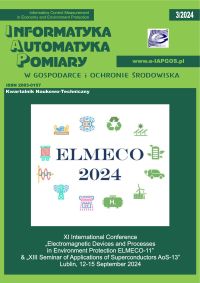OBLICZENIA NUMERYCZNE POCHODNEJ UŁAMKOWEGO RZĘDU W ZAGADNIENIACH POCZĄTKOWYCH, PRZYKŁADY W PROGRAMACH MATLAB I MATHEMATICA
Marcin Sowa
marcin.sowa@polsl.plSilesian University of Technology, Faculty of Electrical Engineering, Institute of Electrical Engineering and Computer Science (Polska)
Abstrakt
Artykuł dotyczy numerycznej metody, którą wykorzystać można do obliczeń pochodnej ułamkowego rzędu w definicji Caputo i Riemanna-Liouville’a. Metoda ta może być wykorzystana przy rozwiązywaniu zagadnień początkowych. Metoda nosi nazwę SubIval, co jest akronimem jej poprzedniej, anglojęzycznej nazwy „subinterval-based method” (metoda podprzedziałów). Przedstawiono jej zastosowanie w rozwiązywaniu równań stanu ułamkowego rzędu. Metoda została zaimplementowana w bibliotece DLL z obsługą ActiveX. Przedstawiono przykładowe kody obliczeniowe (w oprogramowaniach MATLAB i Mathematica), które zawierają wskazówki dotyczące zastosowania biblioteki.
Słowa kluczowe:
pochodna ułamkowego rzędu, analiza numeryczna, analiza obwodów, równania całkowo-różniczkoweBibliografia
Abdeljawad T.: On Riemann and Caputo fractional differences. Computers and Mathematics with Applications 62/2011, 1602–1611.
Google Scholar
Arikoglu A., Ozkol I.: Solution of fractional integro-differential equations by using fractional differential transform method. Chaos, Solitons & Fractals 40(2)/2007, 521–529.
Google Scholar
Brociek R., Słota D., Wituła R.: Reconstruction of the Thermal Conductivity Coefficient in the Time Fractional Diffusion Equation. Advances in Modelling and Control of Non-integer-Order Systems 2016, 239–247.
Google Scholar
Caputo M.: Linear models of dissipation whose Q is almost frequency independent – II. Geophysical Journal International 13(5)/1967, 529–539.
Google Scholar
Cui M.: Compact finite difference method for the fractional diffusion equation. Journal of Computational Physics 228/2009, 7792–7804.
Google Scholar
Ducharne B., Sebald G., Guyomar D., Litak G.: Dynamics of magnetic field penetration into soft ferromagnets. Journal of Applied Physics 117/2015, 243907.
Google Scholar
Huang L., Xian-Fang L., Zhao Y., Duan X.Y.: Approximate solution of fractional integro-differential equations by Taylor expansion method. Computers and Mathematics with Applications 62/2011, 1127–1134.
Google Scholar
Jakubowska A., Walczak J.: Analysis of the Transient State in a Series Circuit of the Class RLC. Circuits, Systems and Signal Processing 35/2016, 1831–1853.
Google Scholar
Katugampola U.N.: A new approach to generalized fractional derivatives. Bull. Math. Anal. Appl. 6(4)/2014, 1–15.
Google Scholar
Kawala-Janik A., Podpora M., Gardecki A., Czuczwara W., Baranowski J., Bauer W.: Game controller based on biomedical signals. Methods and Models in Automation and Robotics (MMAR) 2015, 20th International Conference, 934–939.
Google Scholar
Klamka, J., Czornik, A., Niezabitowski, M., Babiarz, A.: Controllability and minimum energy control of linear fractional discrete-time infinite-dimensional systems. Control & Automation (ICCA) 2014, 11th IEEE Conference, 1210–1214.
Google Scholar
Lubich C.: Fractional linear multistep methods for Abel-Volterra integral equations of the second kind. Math. Comput. 45/1985, 463–469.
Google Scholar
Momani S., Noor M.A: Numerical methods for fourth order fractional integro-differential equations. Appl. Math. Comput. 182/2006, 754–760.
Google Scholar
Munkhammar J.D.: Riemann-Liouville fractional derivatives and the Taylor-Riemann series. UUDM Project Report 7/2004, 1–18.
Google Scholar
New MATLAB External Interfacing Features in 2009a. MathWorks.http://www.mathworks.com/videos/new-external-interfacing-features-in-r2009a-101547.html (available 15.06.2016).
Google Scholar
Ostalczyk P. W., Duch P., Brzeziński D. W., Sankowski D.: Order Functions Selection in the Variable-, Fractional-Order PID Controller. Advances in Modelling and Control of Non-integer-Order Systems 2014, 159–170.
Google Scholar
Rawashdeh E.A.: Numerical solution of fractional integro-differential equations by collocation method. Applied Mathematics and Computation 176/2006, 1–6.
Google Scholar
Saeedi H., Mohseni Moghadam M.: Numerical solution of nonlinear Volterra integro-differential equations of arbitrary order by CAS wavelets. Commun. Nonlinear Sci. Numer. Simulat. 16/2011, 1216–1226.
Google Scholar
Schäfer I., Krüger K.: Modelling of lossy coils using fractional derivatives. Phys. D: Appl. Phys. 41/2008, 1–8.
Google Scholar
Skruch P., Mitkowski W.: Fractional-order models of the ultracapacitors. Advances in the Theory and Applications of Non-Integer Order Systems. Springer International Publishing 2013, 281–293.
Google Scholar
Sowa M.: A subinterval-based method for circuits with fractional order elements. Bull. Pol. Ac.: Tech. 62(3)/2014, 449–454.
Google Scholar
Włodarczyk M., Zawadzki A.: RLC circuits in aspect of positive fractional derivatives. Scientific Works of the Silesian University of Technology: Electrical Engineering 1/2011, 75–88.
Google Scholar
Autorzy
Marcin Sowamarcin.sowa@polsl.pl
Silesian University of Technology, Faculty of Electrical Engineering, Institute of Electrical Engineering and Computer Science Polska
Statystyki
Abstract views: 463PDF downloads: 150
Licencja

Utwór dostępny jest na licencji Creative Commons Uznanie autorstwa – Na tych samych warunkach 4.0 Miedzynarodowe.
Inne teksty tego samego autora
- Marcin Sowa, SPECJALISTYCZNE OBLICZENIA SYMBOLICZNE DLA PROBLEMÓW W STANACH USTALONYCH , Informatyka, Automatyka, Pomiary w Gospodarce i Ochronie Środowiska: Tom 3 Nr 1 (2013)








